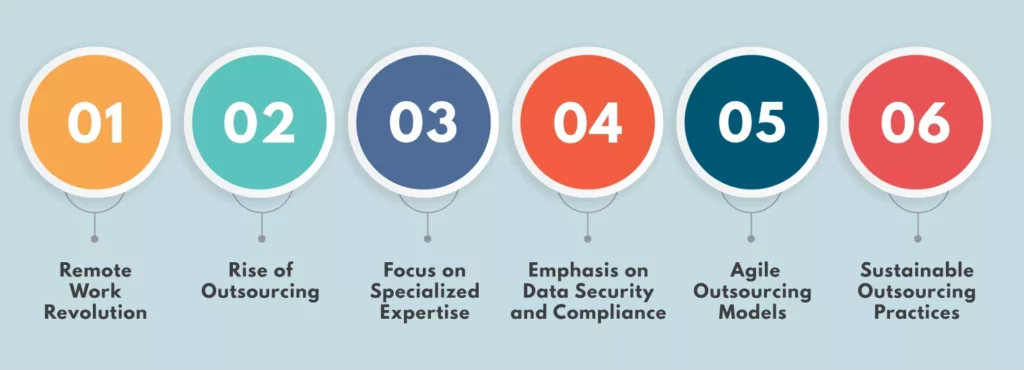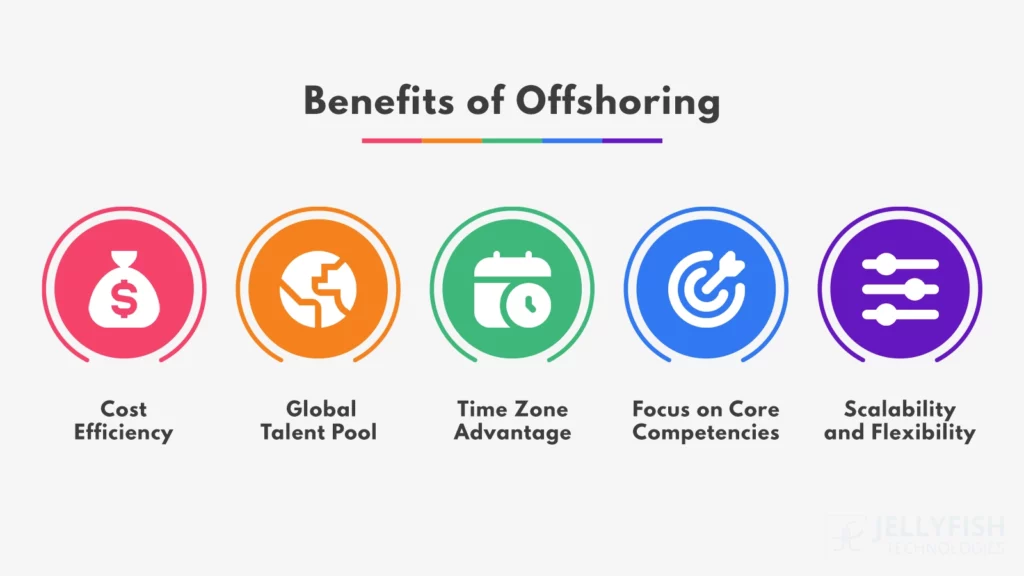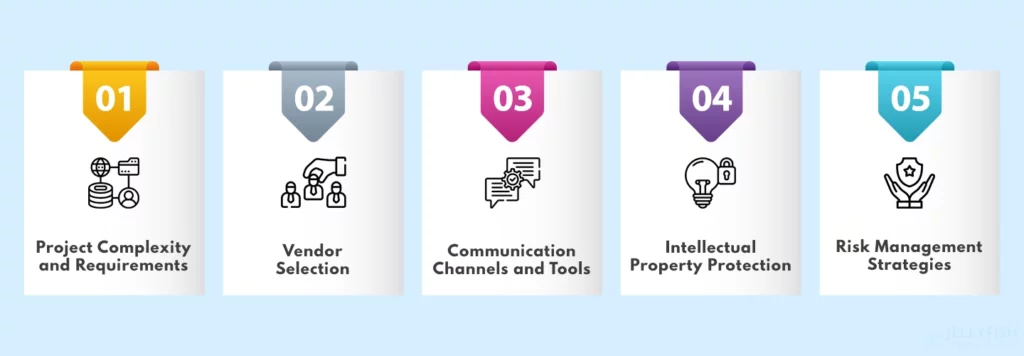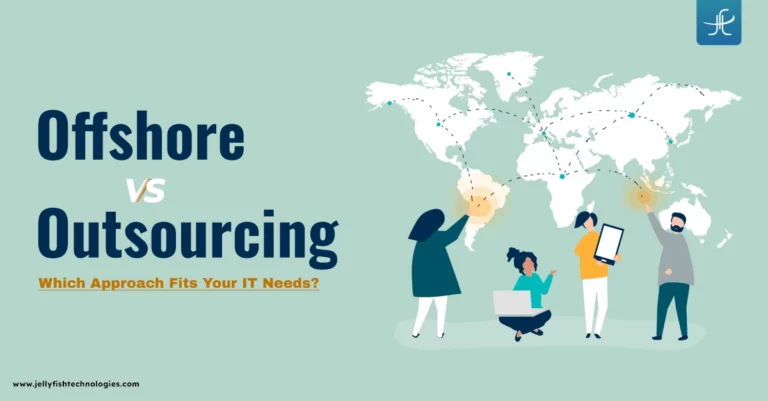In today's globalized world, businesses are constantly seeking ways to optimize their operations and remain competitive. The past decade witnessed a surge in technological advancements, and the demand for skilled developers, but recent events, notably post-pandemic, have accelerated digital initiatives, further amplifying the need for proficient software development services.
Amidst this turnaround, businesses seeking to translate their visions into reality are increasingly turning to software development firms for support. Tech expertise has emerged as a cornerstone, prompting companies to navigate various avenues for acquiring talent, whether through hiring foreign professionals, nurturing young graduates, or recruiting skilled software engineers.
When it comes to software development, two prominent options emerge: offshore development and outsourcing. But the question remains, what is the difference between offshoring and outsourcing?
Despite their similarities, they represent distinct business strategies, each offering unique advantages and challenges. Understanding the nuances between outsourcing and offshoring is paramount, particularly for those seeking to maximize the potential of their software ideas.
Know the intricacies of both concepts, exploring their definitions, drawbacks, key considerations, and comparative analysis. But which one is the right choice for your project in 2024? This blog will help you navigate the differences and make an informed decision.
An Overview: Offshore Software Development
Offshore software development refers to the practice of hiring a software development team or company located in a different country or geographical region to carry out software development tasks.
One of the primary reasons companies opt for offshore software development is cost efficiency. Countries with lower labor costs, such as India, Ukraine, and Vietnam, often offer competitive pricing for software development services compared to Western countries. This cost advantage allows businesses to allocate their budgets more strategically and invest in other areas of their operations.
Additionally, offshore development provides access to a diverse talent pool with specialized skills and expertise. Companies can tap into this talent pool to find developers with specific technical proficiencies or industry knowledge that may be lacking in their local market.
Moreover, offshore software development facilitates round-the-clock development cycles. With teams located in different time zones, work can continue around the clock, accelerating project timelines and reducing time-to-market.
An Overview: Outsourcing Software Development
Outsourcing has long been a strategic business practice, enabling companies to delegate specific tasks to external parties to streamline operations and focus on core competencies. However, as the business landscape evolves, so does the outsourcing industry. Let’s dive into the latest trends in outsourcing and how they’re revolutionizing the way businesses operate.
- Remote Work Revolution
- Rise of Outsourcing
- Focus on Specialized Expertise
- Emphasis on Data Security and Compliance
- Agile Outsourcing Models
- Sustainable Outsourcing Practices

The outsourcing software development services landscape is evolving rapidly, driven by technological advancements, changing market dynamics, and shifting customer expectations. Whether it’s IT services, customer support, or back-office operations, outsourcing allows businesses to focus on their core competencies while delegating non-core activities to experts who can handle them more efficiently.
But what makes outsourcing truly remarkable? It’s the promise of unlocking untapped potential, driving innovation, and propelling growth. By tapping into a global talent pool, outsourcing enables companies to access specialized skills, knowledge, and experience that may be limited or available internally. This influx of expertise fuels creativity, fosters collaboration, and accelerates problem-solving, ultimately driving business success.
Moreover, outsourcing isn’t just about cutting costs—it’s about optimizing resources and maximizing value. By outsourcing non-core functions to specialized providers, companies can reduce operational overhead, improve efficiency, and allocate resources more strategically. This allows businesses to invest in innovation, expansion, and market differentiation, positioning them for long-term growth and sustainability.
In today’s hyper-connected, rapidly evolving business landscape, outsourcing isn’t just an option—it’s a strategic imperative. It’s the secret tool that empowers businesses to navigate uncertainty, seize opportunities, and chart a course toward success.
Importance Of Choosing The Right Approach In 2024
In the dynamic landscape of 2024, characterized by rapid technological advancements, shifting market dynamics, and evolving consumer preferences, choosing the right approach is paramount for businesses to thrive and stay ahead of the competition. Here’s why selecting the right approach is more crucial than ever in 2024:
1. Adapting to Emerging Technologies:
With breakthrough technologies such as artificial intelligence, natural language processing, and the Internet of Things (IoT) reshaping industries, businesses must choose the right approach to leverage these innovations effectively. Whether it’s integrating AI-driven analytics into decision-making processes or implementing blockchain for secure transactions, the right approach ensures businesses stay at the forefront of technological advancements.
2. Navigating Evolving Consumer Trends:
Consumer behavior is constantly evolving, driven by factors such as demographic shifts, changing preferences, and emerging market trends. Choosing the right approach allows businesses to stay agile and responsive to these changes.
3. Optimizing Operational Efficiency:
It is crucial for business success. The right approach involves streamlining processes, leveraging automation, and optimizing resource allocation to maximize productivity and minimize costs.
4. Mitigating Risks and Uncertainties:
The business environment in 2024 is characterized by unprecedented levels of volatility, uncertainty, complexity, and ambiguity (VUCA). Choosing the right approach involves assessing risks, identifying potential threats, and implementing strategies to mitigate uncertainties effectively.
5. Promoting Innovation and Growth:
Innovation is the lifeblood of business growth in 2024. The right approach encourages a culture of innovation, creativity, and experimentation, empowering employees to think outside the box and pursue groundbreaking ideas.
By embracing emerging technologies, adapting to evolving consumer trends, optimizing operational efficiency, mitigating risks, promoting innovation, and building resilience, businesses can position themselves for growth, profitability, and sustainability in the years to come.
Understanding Offshore Software Development
Offshore software development refers to the practice of outsourcing software development tasks to external teams or companies located in different countries, typically in regions where labor costs are lower or where specific expertise is readily available. This approach allows businesses to leverage global talent pools, access specialized skills, and streamline development processes.
By partnering with offshore development teams or IT Staff Augmentation Services Providers, companies can effectively extend their internal resources, accelerate project timelines, and achieve cost savings compared to maintaining in-house teams.
Moreover, these software development services offer businesses the flexibility to scale their development efforts according to project requirements and market demands. Whether it’s scaling up resources to meet tight deadlines or downsizing teams during quieter periods, offshore partnerships provide a cost-effective and agile solution.
Benefits of Offshore Software Development
Offshore software development involves delegating software development tasks to teams located in different countries, typically in regions with lower labor costs. Let’s get acquainted with the diverse benefits it offers:

| Benefits | Description |
|---|---|
| Cost Efficiency | Offshore development often provides access to skilled professionals at significantly lower costs compared to in-house teams. |
| Global Talent Pool | Businesses can tap into a diverse talent pool worldwide, gaining access to Specialized expertise and diverse perspectives. |
| Time Zone Advantage | Leveraging time zone differences enables round-the-clock development, accelerating project timelines and enhancing productivity. |
| Focus on Core Competencies | Outsourcing non-core tasks allows companies to focus on their core competencies and strategic initiatives, driving innovation and growth. |
| Scalability and Flexibility | Offshore teams offer scalability, allowing businesses to swiftly adjust team sizes based on project requirements, without the overhead of recruitment. |
Potential Challenges and Risks of Offshore Software Development
While offshore software development offers numerous advantages, it also presents certain challenges and risks:
- Communication Barriers: Differences in language, culture, and communication styles can lead to misunderstandings and hinder project progress.
- Quality Assurance: Ensuring consistent quality across geographically dispersed teams may pose challenges, requiring robust QA processes.
- Security Concerns: Offshoring involves sharing sensitive data with external parties, necessitating stringent security measures to mitigate risks.
- Time Zone Misalignment: Managing teams across different time zones requires meticulous scheduling to facilitate collaboration and minimize delays.
- Legal and Compliance Issues: Adhering to diverse legal frameworks and compliance standards in offshore locations demands thorough due diligence and legal expertise.
To manage IT services remotely, ODCs (Offshore development centers) are established in a foreign country by the company. To get a detailed idea about offshore development centers, visit our blog.
Factors to Consider Before Opting for Offshore Software Development
Before embarking on offshore software development, businesses must carefully evaluate several key factors:
- Project Complexity and Requirements: Assess the complexity of the project, considering factors such as the technology stack, scope, and timeline.
- Vendor Selection: Conduct thorough research and due diligence to select a reliable offshore partner with a proven track record and a compatible culture.
- Communication Channels and Tools: Establish clear communication channels and leverage collaboration tools to facilitate seamless interaction and transparency.
- Intellectual Property Protection: Implement robust IP protection mechanisms, including non-disclosure agreements and secure development practices.
- Risk Management Strategies: Develop comprehensive risk management strategies to anticipate and mitigate potential challenges, ensuring project success.

Exploring Software Development Outsourcing in 2024
Outsourcing has become an integral part of modern business strategies, enabling companies to streamline operations, access specialized skills, and reduce costs. Outsourcing involves contracting tasks, functions, or processes to external parties, often located offshore, to leverage their expertise and resources. Its key characteristics include:
- Specialization: Outsourcing allows businesses to access specialized skills and knowledge not available in-house.
- Cost Efficiency: By outsourcing non-core functions, companies can reduce overhead costs associated with hiring and training employees.
- Flexibility: Outsourcing offers scalability, enabling businesses to adapt quickly to changing market demands.
- Globalization: Outsourcing facilitates access to a global talent pool, providing opportunities for international expansion.
Let’s look into the potential advantages and disadvantages of outsourcing:
Advantages of Outsourcing Software Development
| Advantages | Description |
|---|---|
| Cost Savings | Outsourcing can result in significant cost savings, especially for labor-intensive tasks. |
| Focus on Core Activities | By outsourcing non-core functions, companies can focus on their core competencies. |
| Access to Expertise | Outsourcing allows access to specialized skills and knowledge not available internally. |
| Scalability | Outsourcing provides scalability, enabling businesses to expand or downsize as needed. |
Disadvantages of Outsourcing Software Development
| Disadvantages | Description |
|---|---|
| Communication Barriers | Managing outsourced teams may pose challenges due to cultural differences and language barriers. |
| Quality Control | Maintaining quality standards can be difficult when tasks are outsourced to external vendors. |
| Data Security Risks | Outsourcing sensitive functions may expose businesses to data breaches and cybersecurity threats. |
| Dependency on Suppliers | Over-reliance on external vendors can lead to vulnerabilities in supply chains and service delivery. |
Emerging Trends and Market Dynamics of Offshoring & Outsourcing Software Development
As we navigate the complexities of the global economy, outsourcing remains a strategic tool for businesses to achieve operational efficiency and competitiveness.
- Digital Transformation: The rise of technologies such as AI, blockchain, and IoT is driving demand for outsourcing digital transformation initiatives.
- Remote Work: The COVID-19 pandemic accelerated the adoption of remote work, leading to a surge in outsourcing arrangements to support distributed teams.
- Nearshoring: Companies are increasingly favoring nearshore outsourcing destinations to mitigate risks associated with offshore locations and improve collaboration.
- Focus on Value-Added Services: Outsourcing providers are shifting towards offering value-added services such as analytics, automation, and consulting to meet evolving client needs.

In 2024, the outsourcing business continues to evolve with the rise of digital transformation, remote work, and the adoption of emerging technologies such as AI, blockchain, and IoT, shaping new opportunities and challenges for organizations worldwide.
Comparing Offshore Software Development and Outsourcing
This comparison highlights the difference between offshore and outsourcing, helping businesses make informed decisions based on their specific requirements and objectives.
| Aspect | Offshore Development | Outsourcing |
|---|---|---|
| Definition | Setting up a dedicated development team in a foreign country. | Contracting tasks or functions to external parties, often offshore. |
| Location | The development team is located in a different country. | External parties may be located offshore or domestically. |
| Control | More control over the development process and team management. | Less direct control over the outsourced tasks or processes. |
| Cost | Potentially lower costs due to access to cheaper labor markets. | Can result in cost savings by leveraging external expertise. |
| Communication | Communication challenges due to time zone differences and language barriers. | Communication may still face challenges but can be mitigated with proper management. |
| Expertise | Access to a global talent pool with diverse skill sets. | Access to specialized skills and knowledge not available internally. |
| Scalability | Offers scalability by easily scaling the team up or down as needed. | Provides scalability by outsourcing non-core functions. |
| Focus on Core Activities | Allows companies to focus on core business activities. | Enables companies to focus on their core competencies. |
| Risk Management | Involves higher risks related to cultural differences, legal compliance, and political instability. | Risks can be mitigated by choosing reputable outsourcing partners and conducting thorough due diligence. |
| Flexibility | Offers flexibility in adapting to changing project requirements. | Provides flexibility in adjusting resource allocation based on business needs. |
What to Choose? Offshore Development or Outsourcing?
As businesses seek to optimize their operations and remain competitive in today’s global market, the decision between offshore development and outsourcing plays a crucial role. Both options offer unique advantages and challenges, making it essential for companies to carefully assess their project requirements, budget constraints, and long-term strategic goals. In this we’ll explore the key factors to consider when making this decision, backed by charts, facts, and figures.
Assessing Project Requirements and Objectives:
Before deciding between offshore development and outsourcing, it’s essential to understand the specific requirements and objectives of your project. Consider factors such as:
1. Complexity of the Project:
Complex projects may benefit from offshore development, where you can have greater control over the development process and team management.
2. Specialized Skills Needed:
If your project requires specialized skills not available internally, outsourcing to external vendors with expertise in those areas may be the best option.
3. Time Sensitivity:
Evaluate the urgency of your project and the time zone differences involved. Offshore development teams may face communication challenges due to time zone disparities.
Evaluating Budget and Resource Constraints:
Budget and resource constraints are significant factors in the decision-making process. Consider the following:
1. Cost Analysis:
Conduct a thorough cost analysis to compare the expenses associated with offshore development versus outsourcing. Offshore development may offer cost savings due to access to cheaper labor markets, while outsourcing can provide scalability and flexibility in resource allocation.
2. Resource Availability:
Assess the availability of internal resources and expertise. If your team lacks the necessary skills or capacity to handle the project internally, outsourcing may be a more practical choice.
3. Risk Management:
Evaluate the risks associated with each option, including cultural differences, legal compliance, and political instability in offshore locations. Outsourcing to reputable vendors with a proven track record can mitigate these risks.
Considering Long-Term Strategic Goals:
The decision between offshore development and outsourcing should align with your company’s long-term strategic goals. Consider the following:
1. Core Competencies:
Determine whether the project aligns with your company’s core competencies. Outsourcing non-core functions allows you to focus on strategic initiatives that drive growth and innovation.
2. Scalability and Flexibility:
Assess the scalability and flexibility offered by each option. Offshore development may provide greater control and customization, while outsourcing enables quick adaptation to changing business needs.
3. Competitive Advantage:
Evaluate how each option contributes to your company’s competitive advantage. Offshore development may offer unique capabilities and market insights, while outsourcing can provide access to a global talent pool and specialized expertise for your DevOps services, AI development, application modernization, and many more.
Future Outlook and Trends in Offshore Development and Outsourcing
Looking ahead, the future of offshore development and outsourcing is promising, with several trends shaping the landscape:
1. Continued Digital Transformation: The rapid adoption of technologies like AI-driven IoT, and blockchain, will drive demand for offshore development and outsourcing services.
2. Enhanced Collaboration Tools: Advancements in communication and collaboration tools will facilitate seamless interaction between distributed teams, overcoming barriers such as time zone differences and language barriers.
3. Emphasis on Cybersecurity: As data security concerns continue to rise, offshore development and outsourcing providers will prioritize cybersecurity measures to protect sensitive information and mitigate risks.
4. Focus on Value-Added Services: Outsourcing providers will increasingly offer value-added services such as data analytics, automation, and consulting to meet evolving client needs and deliver greater value.
Final Thoughts
In conclusion, choosing between offshore development and outsourcing requires careful consideration of project requirements, budget constraints, and long-term strategic goals. By utilizing data-driven insights and staying abreast of emerging trends, businesses can make informed decisions that drive success and innovation in today’s dynamic business landscape.
We would love to hear your comments relating to the post. Do you have some other thoughts? Drop us words through our contact page.


